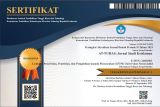Aini, N. N., & Prastowo, A. (2021). Implementasi Metode Burhani Dan ‘Irfani Dalam Studi Filsafat Pendidikan Islam. Andragogi: Jurnal Pendidikan Islam Dan Manajemen Pendidikan Islam, 3(2), 296–302. https://doi.org/10.36671/andragogi.v3i2.228
Al-Hafidz, A. W. (2005). Kamus Ilmu Al-Qur’an. Amzah.
Al-Isfahani, A.-R. (1961). Al-Mufradat fi Gharib al-Qur’an (1st ed.).
Al-Jabiri, M. A. (1989). Isykliyat al-Fikr al-Arabi al-Mu’ashir. Markaz Dirasah al-Arabiyah.
Al-Qasimi, M. J. al-D. (1957). Mahasin al-Ta’wil (VII). Dar Ihya al-Kutub al-’Arabiyyah.
Al-Sya’rawi, M. (2020). Tafsir wa Khawathir al-Qur’an al-Karim Li Imami al-Duah Fadidlah al-Syaikh al-Sya’rawi. Syirkah Media Pro Tec.
Al Ma’mun, H. (2022). Hubungan Epistemologi Keislaman Muhammad Abid Al-Jabiri dengan Tipologi Penafsiran Al-Qur’an. Journal of Islamic Civilization, 3(2), 135–148. https://doi.org/10.33086/jic.v3i2.2252
Amrullah, M. A., B.K.P.S, A. M., Fawaid, I., & Alfaruq, M. I. (2022). Implementasi Bayani, Irfani, Burhani Terhadap Pendidikan Karakter Santri Dalam Sistem Pendidikan Di Pesantren. El Buhuth: Borneo Journal Of Islamic Studies, 5(1), 55–63. https://doi.org/10.21093/el-buhuth.v5i01.4100
Anam, A. (2022). Makna Ummi bagi Muhammad SAW. Menurut Para Mufassir (Sebuah Telaah Tematis). DESKRIPSIA: Jurnal Pengabdian Dan Pemberdayaan Masyarakat, 1(1), 11–23. https://doi.org/10.32616/deskripsia.2022.1.1.11-23
Basid, A., & Rahmah, W. (2023). Melawan Cyberbullying: Membangun Kesadaran Kemanusiaan dalam Etika Bermedia Sosial Perspektif Al-Qur’an. Studia Quranika: Jurnal Studi Quran, 7(2), 203–232. https://doi.org/10.21111/studiquran.v7i2.9013
Eva, N. (2016). Karakteristik Kecerdasan Anak Cerdas Istimewa. Jurnal Sains Psikologi, 5(2), 20–24. https://doi.org/10.17977/um023v5i22016p20-24
Fajriyah, N. H., Sari, P., & Nurhidayati, N. (2021). Upaya Penerapan Sifat Wajib Rasul Di Era Digital Melalui Pemanfaatan Kriptografi Dalam Pengiriman Pesan. Prosiding Konferensi Integrasi Interkoneksi Islam Dan Sains, 37–41.
Faris, I. (1369). Mu’jam Maqayis al-Lughah. Syirkah Maktabah Musthafa al-Bab.
Hadikusuma, W. (2018). Epistemologi Bayani, Irfani dan Burhani Al-Jabiri dan Relevansinya Bagi Studi Agama Untuk Resolusi Konflik dan Peacebuilding. Jurnal Ilmiah Syi’ar, 18(1), 12. https://doi.org/10.29300/syr.v18i1.1510
Hardiono, H. (2021). Epistemologi Postrukturalisme Objek Pemikiran Islam Abed Al-Jabiri Dan Implikasinya Bagi Ilmu-Ilmu Dan Pemikiran Keislaman. TAJDID: Jurnal Ilmu Ushuluddin, 19(1), 110–138. https://doi.org/10.30631/tjd.v19i1.119
Hs, F. (1992). Ensiklopedia al-Qur’an. PT. Rineka Cipta.
Husna, R. (2018). Kritik Muhammad “Abid al-Jabiri Terhadap Konsep Naskh Menurut Jumhur al-’Ulama.” Universitas Islam Negeri Sunan Ampel Surabaya.
Husna, R. (2021). Autentifikasi dan Infiltrasi Dalam Tafsir Ishārī. Mushaf: Jurnal Tafsir Berwawasan Keindonesiaan, 1(2), 125–152. https://doi.org/10.33650/mushaf.v1i2.2089
Ibnu Jarir al-Thabari. (1988). Jami’ al-Bayan fi Tafsir al-Qur’an (I). Dar El-Fikr.
Ishom, M. (2017). Rekontekstualisasi Makna “al-Ummi” pada Diri Nabi. NU Online. https://www.nu.or.id/opini/rekontekstualisasi-makna-al-ummi-pada-diri-nabi-IsTOV
Isnaini, M. A., & Soleh, A. K. (20238). Analisis Epistimologi Burhani Dalam Pembelajaran Pai. Raudhah Proud To Be Professionals : Jurnal Tarbiyah Islamiyah, 2(1), 196–210. https://doi.org/10.48094/raudhah.v8i1.256
Mandzur, A. al-F. J. al-D. M. I. M. ibn. (n.d.). Lisan al-’Arab (XII). Dar Sadir.
Maulana, A. N., & Lutfillah, W. R. (2023). Ta’wil Al-Qur’an Imam Al-Ghazali: Telaah Metodologis atas Kitab Tafsir al-Imam al-Ghazali Karya Muhammad al-Rihani. Firdaus: Jurnal Keislaman, Pemikiran Islam, Dan Living Qur’an, 2(2), 147–165.
Muhammad. (2020). Al-Ummi Dalam Al-Qur’an; Studi Tafsir Tematik Terhadap Literasi Nabi Muhammad. Tribakti: Jurnal Pemikiran Keislaman, 31(1). https://doi.org/10.33367/tribakti.v31i1.963
Mukmin. (2017). Konsep Keummian Nabi Muhammad Dalam Al-Qur’an (Tela’ah Kritis Terhadap Pemikiran Agus Mustofa Dalam Perspektif Ilmu Balaghah). Prosising Konferensi Nasional Bahasa Arab III, 551–561. http://prosiding.arab-um.com/index.php/konasbara/article/view/163
Mustofa, A. (2008). Metamorfosis Sang Nabi: Dari Buta Huruf Menjadi Ilmuwan Jenius. Padma Press.
Na’im, Z. (2021). Epistimologi Islam dalam Perpsektif M. Abid Al Jabiri. TRANSFORMATIF, 5(2), 163–176. https://doi.org/10.23971/tf.v5i2.2774
Niam, A. (2021). Metode Penafsiran Kontemporer Abid Al-Jabiri. Jurnal Ulunnuha, 10(1), 1–12. https://doi.org/10.15548/ju.v10i1.2251
Rangkuti, C. (2016). Implementasi Metode Bayani, Burhani, Tajribi Dan ‘Irfani Dalam Studi Filsafat Pendidikan Islam. WARAQAT: Jurnal Ilmu-Ilmu Keislaman, 1(2), 1–12. https://doi.org/10.51590/waraqat.v1i2.37
Salda, M. I. (2018). Makna Ummi Dan Penisbahannya Kepada Nabi Muhammad SAW Dalam Al-Qur’an. In UIN Ar-Raniry.
Shihab, M. Q. (2012). Tafsir Al-Mishbah: Pesan, Kesan Dan Keserasian Al-Qur’an (IX). Lentera Hati.
Shihab, M. Q. (2018). Membaca Sirab Nabi Muhammad saw. Dalam Sorotan Al-Qur’an dan Hadis-Hadis Shahih. Lentera Hati.
Silverman, L. K. (2002). Upside-Down Brilliance: The Visual-Spatial Learner. DeLeon Publishing.
Soleh, A. K. (2005). Model-model Epistemologi Islam. PSIKOISLAMIKA: Jurnal Psikologi Dan Psikologi Islam, 2(2), 194–201. https://doi.org/10.18860/psi.v0i0.342
 (Universitas Islam Negeri Maulana Malik Ibrahim Malang)
(Universitas Islam Negeri Maulana Malik Ibrahim Malang) 




.png)






